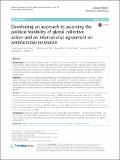| dc.contributor.author | Rogers Van Katwyk, Susan | en_US |
| dc.contributor.author | Danik, Marie Évelyne | en_US |
| dc.contributor.author | Pantis, Ioana | en_US |
| dc.contributor.author | Smith, Rachel | en_US |
| dc.contributor.author | Røttingen, John-Arne | en_US |
| dc.contributor.author | Hoffman, Steven J. | en_US |
| dc.date.accessioned | 2017-12-06T16:24:21Z | |
| dc.date.issued | 2016 | en_US |
| dc.identifier.citation | Rogers Van Katwyk, Susan, Marie Évelyne Danik, Ioana Pantis, Rachel Smith, John-Arne Røttingen, and Steven J. Hoffman. 2016. “Developing an approach to assessing the political feasibility of global collective action and an international agreement on antimicrobial resistance.” Global Health Research and Policy 1 (1): 20. doi:10.1186/s41256-016-0020-9. http://dx.doi.org/10.1186/s41256-016-0020-9. | en |
| dc.identifier.issn | | en |
| dc.identifier.uri | http://nrs.harvard.edu/urn-3:HUL.InstRepos:34493346 | |
| dc.description.abstract | Background: Antimicrobial resistance (AMR) is a global issue. International trade, travel, agricultural practices, and environmental contamination all make it possible for resistant microbes to cross national borders. Global collective action is needed in the form of an international agreement or other mechanism that brings states together at the negotiation table and commits them to adopt or implement policies to limit the spread of resistant microorganisms. This article describes an approach to assessing whether political and stakeholder interests can align to commit to tackling AMR. Methods: Two dimensions affecting political feasibility were selected and compared across 82 countries: 1) states’ global influence and 2) self-interest in addressing AMR. World Bank GDP ranking was used as a proxy for global influence, while human antibiotic consumption (10-year percent change) was used as a proxy for self-interest in addressing AMR. We used these data to outline a typology of four country archetypes, and discuss how these archetypes can be used to understand whether a proposed agreement may have sufficient support to be politically feasible. Results: Four types of countries exist within our proposed typology: 1) wealthy countries who have the expertise and financial resources to push for global collective action on AMR, 2) wealthy countries who need to act on AMR, 3) countries who require external assistance to act on AMR, and 4) neutral countries who may support action where applicable. Any international agreement will require substantial support from countries of the first type to lead global action, and from countries of the second type who have large increasing antimicrobial consumption levels. A large number of barriers exist that could derail efforts towards global collective action on AMR; issues of capacity, infrastructure, regulation, and stakeholder interests will need to be addressed in coordination with other actors to achieve an agreement on AMR. Conclusions: Achieving a global agreement on access, conservation, and innovation – the three pillars of AMR – will not be easy. However, smaller core groups of interested Initiator and Pivotal Countries could develop policy and resolve many issues. If highly influential countries take the lead, agreements could then be scaled up to achieve global action. Electronic supplementary material The online version of this article (doi:10.1186/s41256-016-0020-9) contains supplementary material, which is available to authorized users. | en |
| dc.language.iso | en_US | en |
| dc.publisher | BioMed Central | en |
| dc.relation.isversionof | doi:10.1186/s41256-016-0020-9 | en |
| dc.relation.hasversion | http://www.ncbi.nlm.nih.gov/pmc/articles/PMC5693542/pdf/ | en |
| dash.license | LAA | en_US |
| dc.subject | AMR | en |
| dc.subject | Antibiotic Resistance | en |
| dc.subject | Global Health | en |
| dc.subject | Political Feasibility | en |
| dc.subject | International Affairs | en |
| dc.title | Developing an approach to assessing the political feasibility of global collective action and an international agreement on antimicrobial resistance | en |
| dc.type | Journal Article | en_US |
| dc.description.version | Version of Record | en |
| dc.relation.journal | Global Health Research and Policy | en |
| dash.depositing.author | Hoffman, Steven J. | en_US |
| dc.date.available | 2017-12-06T16:24:21Z | |
| dc.identifier.doi | 10.1186/s41256-016-0020-9 | * |
| dash.identifier.orcid | 0000-0002-2064-3711 | en_US |
| dash.contributor.affiliated | Hoffman, Steven | |


